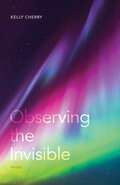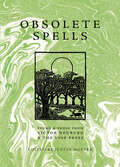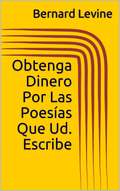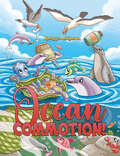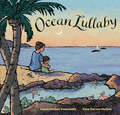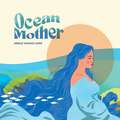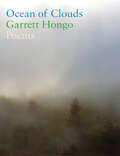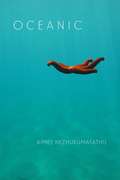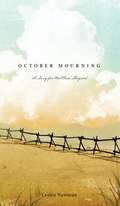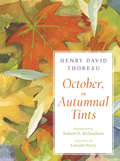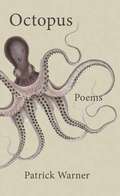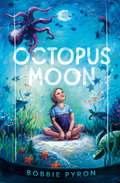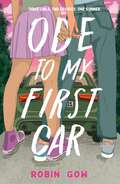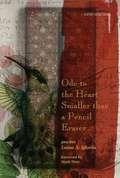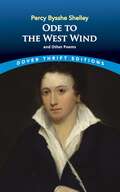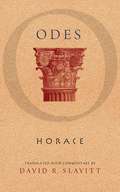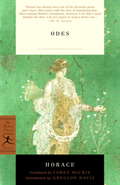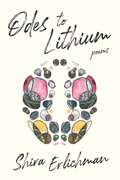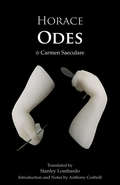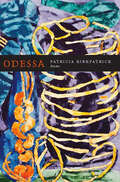- Table View
- List View
Observing the Invisible: Poems
by Kelly CherryIn Observing the Invisible, Kelly Cherry crafts poems that explore the ever-evolving realm of modern physics, confronting the invisibilities and mysteries of the material world. She leverages challenging ideas into a space of contemplative wonder as the book moves from external observation into an increasingly inward space of personal reflection and expression. Throughout, Observing the Invisible remains deliberate in its concentration on what cannot be, almost as if the poems are being erased even as they are being written. Acknowledging that such contradictions cannot sustain themselves for long, Cherry seeks out these difficulties and ultimately finds resolutions.
Obsolete Spells: Poems & Prose from Victor Neuburg & the Vine Press
by Justin HopperA collection of rare pagan poetry and purple prose from the heart of the 1920s counterculture.Victor Neuburg is most famous for two things: discovering Dylan Thomas, and being the man that Aleister Crowley once turned into a camel. Obsolete Spells offers another side of Neuburg, through his own poems and the strange books of Vine Press, the hand-operated imprint he ran from his West Sussex cottage between 1920 and 1930. Neuburg's youth involved terrifying-yet-farcical years as Crowley's lover, victim, and magickal sidekick. His later period, as editor of the influential "Poet's Corner" column for the Sunday Referee, found him a key figure in London's literary scene. But in between, Neuburg acted as a conduit for bohemian writers, arts luminaries, and the sexually adventurous: Peter Warlock set his words to music, singer Marian Anderson lived in his spare room, and he was a fixture at utopian community, the Sanctuary. Through it all, he turned the handle on the Vine Press: books of nature writing and anonymous song; poems and artwork worthy of The Wicker Man, side-by-side with a book on cricket. Obsolete Spells offers a selection of Neuburg's work and others from Vine Press books--over-the-top hymns to the Old Gods, tales from a utopian landscape, and more, most of which has been out of print for a century.
Obtenga Dinero Por Las Poesías Que Ud. Escribe
by Azul Lima Alessi Bernard Levine¿Escribes poesía? Ahora, puedes ganar dinero por la poesía que escribes y lograr publicarlas en tarjetas de felicitación, calendarios, pósters y placas de pared. Si quieres que tus sueños de escritor se hagan realidad y ganar dinero por tus poesías, este libro único es especialmente para Ud. ¡Escribir poemas por dinero es muy divertido y lucrativo! Gane dinero por hacer algo que ama.
Ocean Commotion!
by Kathryn AtkinsonFar out in the ocean, a pod of dolphins spots something unusual. As they swim closer, one curious dolphin ventures ahead for a better look and discovers a hoard of floating plastic waste. Shocked and angered by the pollution, the dolphins decide it is time to teach humanity a lesson for polluting their seas. Working together, the pod devises a bold plan. They will transport the plastic waste back to shore, blockade the port, and create chaos – all to draw attention to the urgent problem of plastics in the ocean.
Ocean Lullaby
by Laura McGee KvasnoskyA soft and soothing good night journey through an ocean filled with sleepy sea creatures, perfect for bedtime in the summer or year-round.The sun is setting. The waves are gently lapping at the shore. It's time for all the ocean creatures to rest. Whales, turtles, dolphins, and more drift and doze. And as the tide pools catch the light of the moon and the stars glowing above, a mother and her baby listen to the soft sounds of the ocean lullaby . . .Shhh, hush. Shhh, hush. The ocean's soothing song. Shhh, hush. Shhh, hush. We can sing along. Praise for Ocean Lullaby: "A delightful winding-down story after a busy day at the beach—or anywhere." --Kirkus Reviews "This dreamy paean to the ocean&’s mesmerizing influence [is] guaranteed to soothe little ones at bedtime." --Booklist
Ocean Mother
by Arielle Taitano LoweOcean Mother tells the story of a young woman’s decision to heal herself, her family, and her home. The poet gives voice to her experience as a CHamoru girl raised in the Pacific Island of Guåhan (Guam), located in Micronesia. Weaving together narratives of family, environment, Indigenous identity, decolonial love, and her CHamoru culture, the poet goes on a journey inward and overseas. She explores the relationships between culture and identity, colonialism and inherited trauma, sense of place and generational healing.
Ocean of Clouds: Poems
by Garrett HongoIn his fourth book of poems, award-winning poet Garrett Hongo sees coastlines and waters, skylines and ancestral lines for what they inspire and teach.In a surpassingly beautiful collection of poems, with his characteristic long-lined, rolling music, Hongo is alert to the possibilities of individual moments of perception and grace in the landscapes of his life, whether waiting for a ferry in Balboa after a writing workshop (&“An oil slick from a yacht . . . / Spread rainbows on the water, an aleph / curving toward us&”) or hanging out and playing LPs with the late, great poet Michael Harper, or watching his daughter in the sun with a halo of messy twelve-year-old&’s hair, or listening to the sea, which speaks to him in so many places: at the Wai&‘ōpae Tidepools, at Cassis, at Divi Bay in Saint Martin, where, he tells us, &“I thought of writing to the soul of Nâzim Hikmet, / saying loving a woman was like writing a book— / . . . it is love&’s body on which you write a page of kisses . . .&”These poems of cloudy moons and sandstone cliffsides, the black glass of lava shattered into sands, waves surging, and stories of a poet&’s gratitude for the journey he has made, come together to make a paean against forgetting.
Oceanic
by Aimee NezhukumatathilWith inquisitive flair, Aimee Nezhukumatathil creates a thorough registry of the earth’s wonderful and terrible magic. In her fourth collection of poetry, she studies forms of love as diverse and abundant as the ocean itself. She brings to life a father penguin, a C-section scar, and the Niagara Falls with a powerful force of reverence for life and living things. With an encyclopedic range of subjects and unmatched sincerity, Oceanic speaks to each reader as a cooperative part of the earth, an extraordinary neighborhood to which we all belong.
October Mourning: A Song For Matthew Shepard
by Lesléa NewmanWINNER OF A 2013 STONEWALL HONOR! A masterful poetic exploration of the impact of Matthew Shepard's murder on the world. On the night of October 6, 1998, a gay twenty-one-year-old college student named Matthew Shepard was lured from a Wyoming bar by two young men, savagely beaten, tied to a remote fence, and left to die. Gay Awareness Week was beginning at the University of Wyoming, and the keynote speaker was Lesléa Newman, discussing her book Heather Has Two Mommies. Shaken, the author addressed the large audience that gathered, but she remained haunted by Matthew's murder. October Mourning, a novel in verse, is her deeply felt response to the events of that tragic day. Using her poetic imagination, the author creates fictitious monologues from various points of view, including the fence Matthew was tied to, the stars that watched over him, the deer that kept him company, and Matthew himself. More than a decade later, this stunning cycle of sixty-eight poems serves as an illumination for readers too young to remember, and as a powerful, enduring tribute to Matthew Shepard's life.
October, or Autumnal Tints
by Henry David Thoreau(From the Dust Jacket Flaps) "Originally delivered as a lecture shortly before the writer's own death, Henry David Thoreau's classic Autumnal Tints is an ode to autumn not as the season of death and decay, but of ripeness, fullness, and maturity. It is perhaps the best piece ever written on the subject of the fall color of the changing leaves. Thoreau hoped one day to turn it into an illustrated book called October, or Autumnal Tints. Thoreau's astute meditations are framed by a biographical essay by acclaimed scholar Robert D. Richardson that delves into the events and relationships influencing Thoreau's philosophy. Sensuous watercolors by Lincoln Perry bring to life the fall colors described so ecstatically by Thoreau, allowing longtime Thoreau fans and leaf-peepers alike to feel as though they are walking among the falling leaves alongside one of our best observers of the natural world."
Octopus
by Patrick WarnerAs apt to channel the confessionalism of Anne Sexton as the red-in-tooth-and-claw nature poetry of Ted Hughes, Patrick Warner's voice ranges freely from the colloquial to the baroque. Over the past fifteen years, by harboring and honoring such fraught tensions. In Octopus we have him at his best.
Octopus Escapes!
by Nathaniel LachenmeyerTold in rhyming couplets, Octopus Escapes is a story that keeps up with Octopus and a security guard who is outsmarted at every turn. A sure bet for read-aloud fun, this entertaining maraud through the amphibious exhibits also includes fun facts about cephalopods. This fun fanciful story is shored up with real information about octopuses and depicts how they move and sneak. With a blend of kid-appeal and fun facts, this engaging story creatively uses sound words, easily enticing repeat readings.
Octopus Moon
by Bobbie PyronA deeply moving middle grade novel in verse about a girl struggling with depression when she starts fifth grade amidst a sea of changes.Pearl loves watching the majestic loggerhead turtles and octopuses glide through the water at the aquarium. Pearl finds it especially easy to identify with the octopuses, who have millions of touch receptors all over their bodies. They feel everything. Sometimes, Pearl wishes she was more like a turtle, with a hard outer shell—it hurts too much to feel everything.And the changes at the start of fifth grade don&’t feel good to Pearl at all. New teachers, lockers, and being in different classes than her friends is unsettling. Pearl tries her best to pretend she&’s fine, but she starts to struggle with things that used to come easy, like schoolwork, laughing and skateboarding with her best friend, Rosie, running and even sleeping.After a disastrous parent-teacher conference, her parents decide to bring Pearl to Dr. Jill, who diagnoses her with depression. At first Pearl is resistant to Dr. Jill&’s help; she doesn&’t like feeling different, but she also doesn&’t want to continue feeling so bad all the time. When Dr. Jill asks Pearl to try one Impossible Thing each day, like running, skateboarding, or walking her dog Tuck, she decides to try. For each impossible thing she attempts, Pearl puts a bead on a string. Bead by bead, and with the support of family and friends, Pearl finds her way back to herself. She discovers just like the moon is always there in the sky, even if it isn&’t full, she&’ll always be herself even when she doesn&’t feel whole.In this tender novel-in-verse, critically acclaimed author Bobbie Pyron draws from her own experiences to tell the story of a brave girl learning to take care of and love herself.
Oculus: Poems
by Sally Wen MaoFINALIST FOR THE LOS ANGELES TIMES BOOK PRIZE FOR POETRYA brilliant second collection by Sally Wen Mao on the violence of the spectacle—starring the film legend Anna May WongIn Oculus, Sally Wen Mao explores exile not just as a matter of distance and displacement but as a migration through time and a reckoning with technology. The title poem follows a nineteen-year-old girl in Shanghai who uploaded her suicide onto Instagram. Other poems cross into animated worlds, examine robot culture, and haunt a necropolis for electronic waste. A fascinating sequence spanning the collection speaks in the voice of the international icon and first Chinese American movie star Anna May Wong, who travels through the history of cinema with a time machine, even past her death and into the future of film, where she finds she has no progeny. With a speculative imagination and a sharpened wit, Mao powerfully confronts the paradoxes of seeing and being seen, the intimacies made possible and ruined by the screen, and the many roles and representations that women of color are made to endure in order to survive a culture that seeks to consume them.
Odd Mercy: Poems
by Gerald Stern"For over two decades, no one has equaled Stern's compassionate, surreal parables about the burden of and the exaltation at being alive."--Library Journal The centerpiece of Gerald Stern's ninth collection is a long poem titled "Hot Dog," named for a beautiful street woman who lives in and around Tompkins Square Park. Other characters in this poem are St. Augustine, Walt Whitman, Noah, Gerald Stern himself, and a ninety-year-old black preacher from the Midwest. In "Hot Dog," and throughout, Stern wrestles with the issues--hope, memory, faith--that have always occupied him.
Ode to My First Car
by Robin GowBy the critically praised author of A Million Quiet Revolutions, this YA contemporary sapphic romance told in verse is about a bisexual teen girl who falls in and out of love over the course of one fateful summer.It’s a few months before senior year and Claire Kemp, a closeted bisexual, is finally starting to admit she might be falling in love with her best friend, Sophia, who she’s known since they were four.Trying to pay off the fine from the crash that totals Lars, her beloved car, Claire takes a job at the local nursing home up the street from her house. There she meets Lena, an eighty-eight-year-old lesbian woman who tells her stories about what it was like growing up gay in the 1950s and ’60s.As Claire spends more time with Lena and grows more confident of her identity, another girl, Pen, comes into the picture, and Claire is caught between two loves–one familiar and well-worn, the other new and untested.
Ode to the Heart Smaller Than a Pencil Eraser
by Luisa A. IgloriaWhen Luisa Igloria cites Epictetus-'as soon as a thing has been seen, it is carried away, and another comes in its place'-she introduces the crowded and contradictory world her poems portray: a realm of transience, yes, where the vulnerable come to harm and everything disappears, but also a scene of tremendous, unpredictable bounty, the gloriously hued density this poet loves to detail. 'I was raised / to believe not only the beautiful can live on / Parnassus,' she tells us, and she makes it true, by including in the cyclonic swirl of her poems practically everything: a gorgeous, troubling over-brimming universe."—:Mark Doty,Mark Doty, judge for the 2014 Swenson AwardThe May Swenson Poetry Award, an annual competition named for May Swenson, honors her as one of America's most provocative and vital writers. During her long career, Swenson was loved and praised by writers from virtually every school of American poetry. She left a legacy of fifty years of writing when she died in 1989. She is buried in Logan, Utah, her hometown.
Ode to the Heart Smaller than a Pencil Eraser (Swenson Poetry Award #volume 17)
by Luisa A. Igloria“When Luisa Igloria cites Epictetus—‘as soon as a thing has been seen, it is carried away, and another comes in its place’—she introduces the crowded and contradictory world her poems portray: a realm of transience, yes, where the vulnerable come to harm and everything disappears, but also a scene of tremendous, unpredictable bounty, the gloriously hued density this poet loves to detail. ‘I was raised / to believe not only the beautiful can live on / Parnassus,’ she tells us, and she makes it true, by including in the cyclonic swirl of her poems practically everything: a gorgeous, troubling over-brimming universe." —Mark Doty, judge for the 2014 Swenson Award The May Swenson Poetry Award, an annual competition named for May Swenson, honors her as one of America's most provocative and vital writers. During her long career, Swenson was loved and praised by writers from virtually every school of American poetry. She left a legacy of fifty years of writing when she died in 1989. She is buried in Logan, Utah, her hometown.
Ode to the West Wind and Other Poems (Dover Thrift Editions Ser.)
by Percy Bysshe ShelleyTreasury of verse by great Romantic poet will give readers an exciting encounter with one of the most original and stimulating figures in English poetry. Includes 37 poems of varying lengths, among them such well-known verses as "Adonais,""Ode to the West Wind," "Ozymandias," "The Cloud," "To a Skylark" and "Arethusa." Alphabetical lists of titles and first lines.
Odes
by David R. SlavittThe "Odes" of Horace are a treasure of Western civilization, and this new English translation is a lively rendition by one of the prominent poet-translators of our own time, David R. Slavitt. Horace was one of the great poets of Rome's Augustan age, benefiting (as did fellow poet Vergil) from the friendship of the powerful statesman and cultural patron Maecenas. These "Odes," which take as their formal models Greek poems of the seventh century BCE-especially the work of Sappho and Alcaeus-are the observations of a wry, subtle mind on events and occasions of everyday life. At first reading, they are modest works but build toward a comprehensive attitude that might fairly be called a philosophy. Charming, shrewd, and intimate, the voice of the "Odes" is that of a sociable wise man talking amusingly but candidly to admiring friends. This edition is also notable for Slavitt's extensive notes and commentary about the art of translation. He presents the problems he encountered in making the translation, discussing possible solutions and the choices he made among them. The effect of the notes is to bring the reader even closer to the original Latin and to understand better how to gauge the distance between the two languages. "
Odes
by Horace Gregson Davis James MichieTimeless meditations on the subjects of wine, parties, birthdays, love, and friendship, Horace's Odes, in the words of classicist Donald Carne-Ross, make the "commonplace notable, even luminous." This edition reproduces the highly lauded translation by James Michie. "For almost forty years," poet and literary critic John Hollander notes, "James Michie's brilliant translations of Horace have remained fresh as well as strong, and responsive to the varying lights and darks of the originals. It is a pleasure to have them newly available."From the Trade Paperback edition.
Odes
by Horace Gregson Davis James MichieTimeless meditations on the subjects of wine, parties, birthdays, love, and friendship, Horace's Odes, in the words of classicist Donald Carne-Ross, make the "commonplace notable, even luminous." This edition reproduces the highly lauded translation by James Michie. "For almost forty years," poet and literary critic John Hollander notes, "James Michie's brilliant translations of Horace have remained fresh as well as strong, and responsive to the varying lights and darks of the originals. It is a pleasure to have them newly available."From the Trade Paperback edition.
Odes To Lithium
by Shira ErlichmanCaptivating poems and visual art seek to bring comfort and solidarity to anyone living with Bipolar Disorder. In this remarkable debut, Shira Erlichman pens a love letter to Lithium, her medication for Bipolar Disorder. With inventiveness, compassion, and humor, she thrusts us into a world of unconventional praise. From an unexpected encounter with her grandmother's ghost, to a bubble bath with Bjӧrk, to her plumber's confession that he, too, has Bipolar, Erlichman buoyantly topples stigma against the mentally ill. These are necessary odes to self-acceptance, resilience, and the jagged path toward healing. With startling language, and accompanied by her bold drawings and collages, she gives us a sparkling, original view into what makes us human.
Odes: With Carmen Saeculare
by HoraceHorace's Odes enjoys a long tradition of translation into English, most famously in versions that seek to replicate the quantitative rhythms of the Latin verse in rhymed quatrains. Stanley Lombardo, one of our preeminent translators of classical literature, now gives us a Horace for our own day that focuses on the dynamics, sense, and tone of the Odes, while still respecting its architectonic qualities.In addition to notes on each of the odes, Anthony Corbeill offers an Introduction that sketches the poet's tumultuous political and literary careers, highlights the Odes' intricate construction and thematic breadth, and identifies some qualities of this work that shed light on a disputed question in its reception: Are these poems or lyrics?This dual-language edition will prove a boon to students of classical civilization, Roman literature, and lovers of one of the great masters of Latin verse. The Amazon Kindle and other flowing-text eBook editions include the text of the Latin originals at the end of the book and the line numbers are enclosed in square brackets and embedded at the end of lines.
Odessa: Poems (Lindquist And Vennum Prize For Poetry Ser.)
by Patricia KirkpatrickThis collection is “an astonishing achievement” that renders grief and illness in “supremely lyrical, brilliantly imagined . . . poetry of the highest order” (Connie Wanek).A grim prognosis, brain cancer, leaves the speaker in Kirkpatrick’s Odessa fighting for her life. The tumor presses against her amygdalae, the “emotional core of the self,” and central to the process of memory.In poems endowed with this emotional charge but void of sentimentality, Kirkpatrick sets out to recreate what was lost by fashioning a dreamlike reality. Odessa, “roof of the underworld,” a refuge at once real and imagined, resembles simultaneously the Midwestern prairie and a mythical god-inhabited city. In image-packed lines bearing shades of Classical heroism, Kirkpatrick delivers a personal narrative of stunning dimension.Winner of the Lindquist & Vennum Prize for PoetryWinner of the Minnesota Book Award
